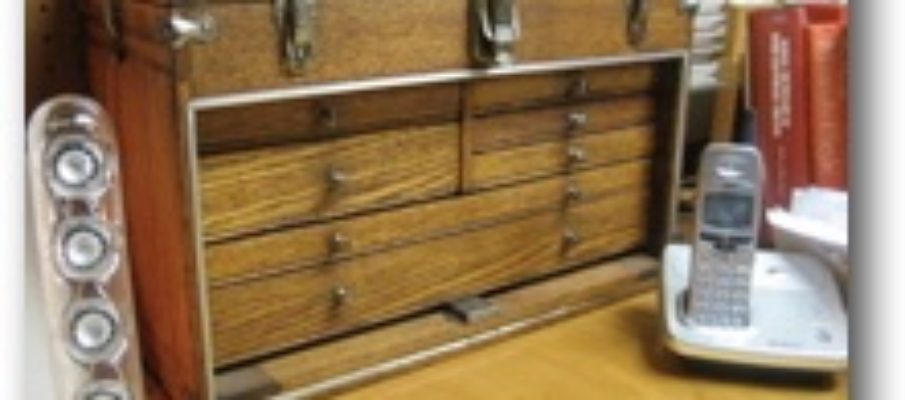What should you stock in your tool box?
You’ll need optimism. You must believe things will work out.
You need confidence. Two sets of that, plus a spare. And a back-up. You can’t work scared. Clients will sense it and be uneasy. Confidence will trump almost anything.
You also need your skill. Whether that is drawing, making photographs, carving, designing, organizing, accounting, making people like you, or writing code. Keep it well honed, oiled, and fully charged.
Everything else is secondary.
When my grandfather worked as a tool and die maker in the ’40s and ’50s, he was expected to supply some of his own tools. He brought along an oak tool chest packed with his dies, taps, mill files, micrometers, bits, gauges and other specialties of his trade gathered over the years.
Having your own gear made it easier to find work. Machine shop foremen saw you as a solid pro, a guy they could hire and not worry about. And for my grandfather, who went shoeless in the Depression, steady work was the holy grail.
His tool chest sits on my desk right now. It is permanently smudged with shop grit and embedded machine oil. In the drawers are the tools of my trade. One stapler. Thirty bulldog clips, a nine-year supply of paperclips, USB cables, pencil stubs, an extra mouse, linty post-it notes, 94 business cards. My Mac OSX CDs. Microsoft Word. Strunk and White.
There’s also a small card my grandfather left in the chest maybe 40 years ago. A note to penciled to himself, in Russian. I have no idea if it’s a to-do list, cheat sheet, or driving directions. But I’m saving it just in case.
I keep the chest for continuity, so I can say its still in the family and still serving an honest trade. (Although my grandfather never quite understood what I did for a living. “So who reads what you write?” “Nobody, really,” I said, “It’s only ad copy.”)
I like having the tool chest here. Makes me feel workmanlike. Like a pro getting a day’s work done.
It’s where I keep my optimism, and two sets of confidence.
Update:
The uber-influential translator Corinne McKay was intrigued by my grandfather’s hand-written note in the post above, and asked her fellow translators if anyone could decipher it.
I was delighted to see that so many were willing to help.
I’ve posted bigger photos of the note, front and back.
One translator said the note appears to include a phonetic rendering of English machinist terms such as “Punch Press”, in Cyrillic. Which suggest they are cheat-sheets on machine settings or instructions.
Just for reference my grandfather, born 1904, referred to himself as Karpatska-Rus, or Lemko, from the Carpathian Mountains on the southern border of Poland.



April 1, 2017 @ 5:38 pm
That’s funny, when I first saw toolbox, I thought immediately of a physical toolbox with screwdrivers and wrenches in it. Then I thought, Oh, wait, we’re talking freelancing in publishing or advertising or like that. But as I read, I realized that over the 25+ years that I’ve freelanced as a book designer/layout artist, I have had to stock a “virtual toolbox” with my stick-to-it-iveness and resilience, in addition to the hardware, softweare, and skills that are my bread and butter.
April 2, 2017 @ 12:28 am
A wise ode to work and tools and a grandfather….touching and true.
p.s. weren’t you coming out with a new Ebook on charging what you are worth–or something like that?
April 14, 2017 @ 10:01 am
Walt, I posted this on LinkedIn thinking maybe some Russian>English translators could take a stab at your grandfather’s note. Corinne McKay also posted it to Twitter (where I suppose I should get an account one of these days…). You could take a look and see what people say — unless you want to leave it mysterious! People are having a hard time because of the image quality, but it seems it may be Ukrainian, not Russian.
April 14, 2017 @ 12:01 pm
Wow, thanks so much for your kind interest. I’ve posted larger photos above. Maybe that will help.